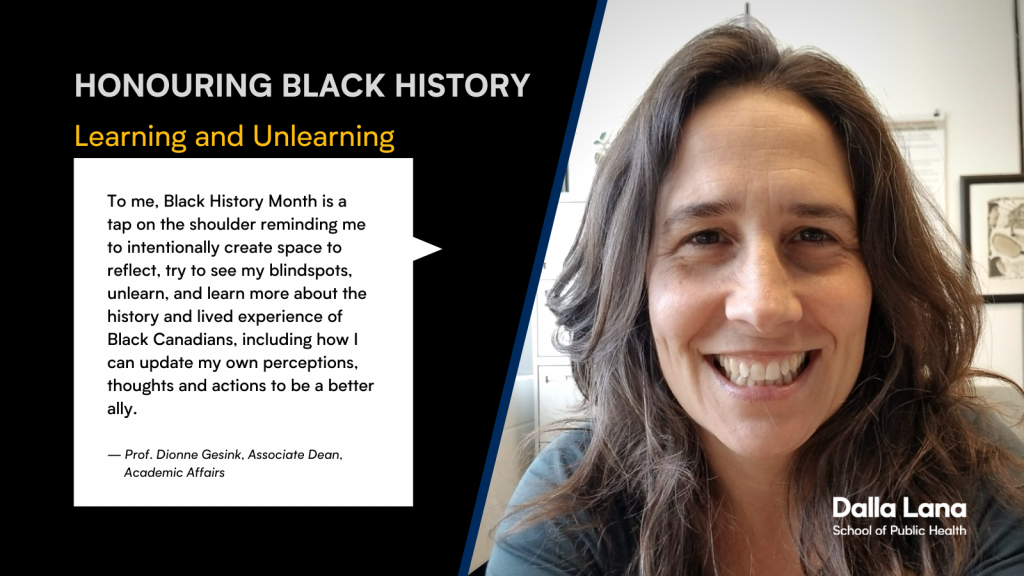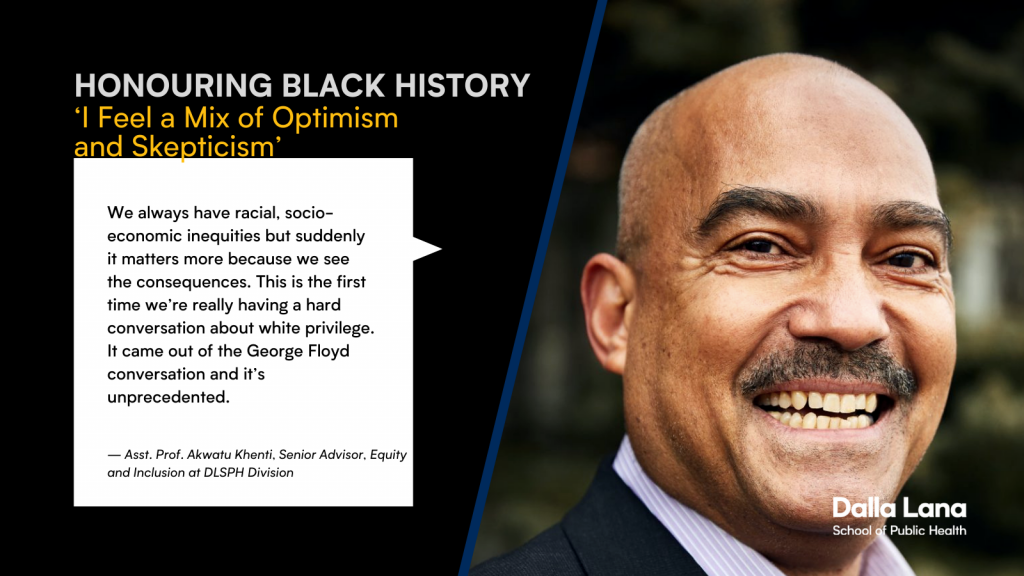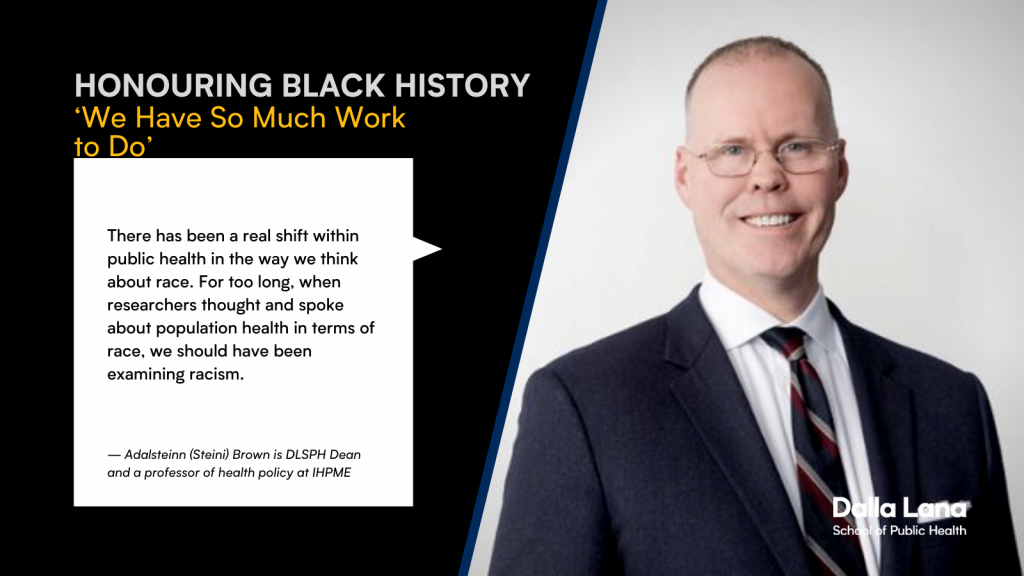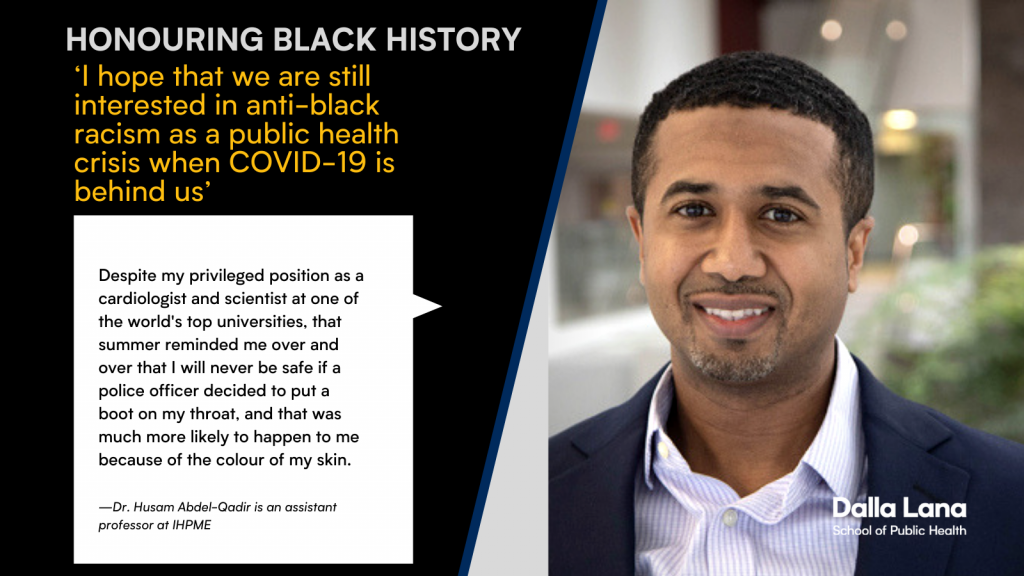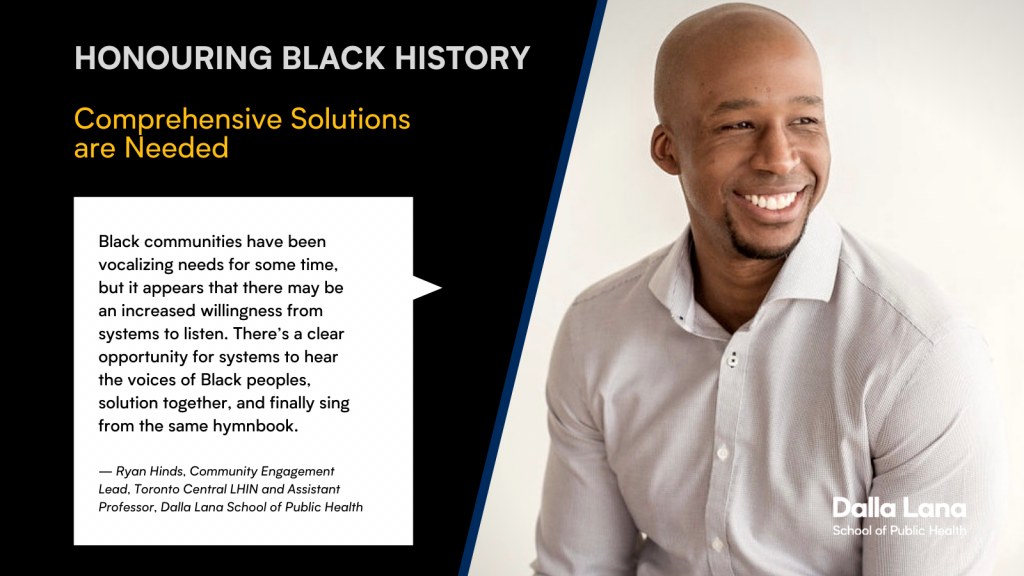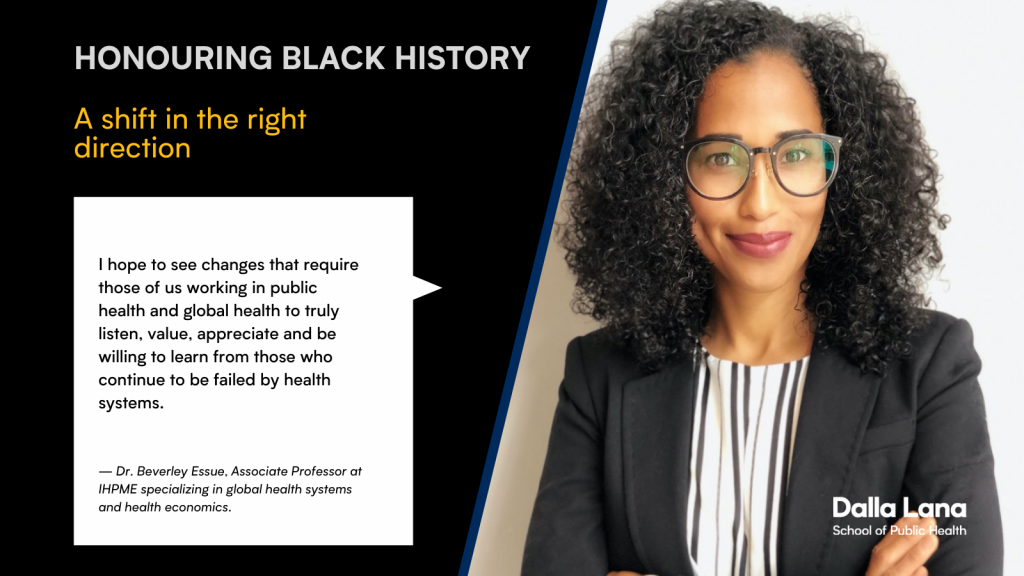DLSPH Commemorates Black History Month
February 17/2021
To help mark this year’s Black History Month, DLSPH leaders and Black scholars are sharing what this moment means to them.
This page will be updated regularly to include more statements from our community.
Learning and Unlearning
To me, Black History Month is a tap on the shoulder reminding me to intentionally create space to reflect, try to see my blindspots, unlearn, and learn more about the history and lived experience of Black Canadians, including how I can update my own perceptions, thoughts and actions to be a better ally. I share in this un/learning with my daughters as well, so they too can be better allies. It’s relatively easy to learn about Black History in the US. I launched my celebration of Black History Month this weekend by binge watching #blackAF on Netflix (which was AMAZING). It takes more effort to learn about Black History in Canada. I also need to reconcile my own internal tension around how to balance my exploration and consumption of Black History, meaning how much energy I focus on recent anti-Black racism events with how much energy I focus on learning about, and being inspired by, the achievements and contributions of Black Canadians. I prefer the latter, but cannot ignore the former.
–Prof. Dionne Gesink, Associate Dean, Academic Affairs
‘I Feel a Mix of Optimism and Skepticism’
This is a historic time because of the pandemic, George Floyd and growing public interest in anti-Black racism. Private sector companies for the first time are investing in efforts to reduce or eliminate anti-Black racism. That’s new. Some had to be blamed and shamed to get there, but still the benefits are huge.
I feel a mix of optimism and skepticism. We have people thinking outside the box and trying to craft new pathways forward – paths that we didn’t think possible before. But COVID inequities and vaccine hesitancy have been bad for Black health. Black patients were the largest racial group to be hospitalized for the virus in December. People who earn below $30,000 a year have worse prognoses from COVID – and when you intersect that with race, it’s a double whammy.
COVID is a reality check that cautions me about not being too optimistic. But at the same time, it has taught a lot of people about white privilege. Edward Said used to say events are social forces momentarily revealed. We always have racial, socio-economic inequities but suddenly it matters more because we see the consequences. This is the first time we’re really having a hard conversation about white privilege. It came out of the George Floyd conversation and it’s unprecedented.
–Asst. Prof. Akwatu Khenti, Senior Advisor, Equity and Inclusion at DLSPH
‘We Have So Much Work to Do’
There has been a real shift within public health in the way we think about race. For too long, when researchers thought and spoke about population health in terms of race, we should have been examining racism. The emergence of racism as an important determinant of Black health is a crucial shift that reflects a more sophisticated understanding of the profound ways social factors, stresses and other lived experiences affect people’s health.
We have so much work to do in understanding the ways that racism and police violence intersect with social determinants of health to produce the fulsome picture of Black public health that is long overdue. But I’m grateful to the brilliant Black scholars at DLSPH who are leading the way, and their many allies within our School.
–Adalsteinn (Steini) Brown is DLSPH Dean and a professor of health policy in the Institute of Health Policy, Management and Evaluation (IHPME).
‘I hope that we are still interested in anti-black racism as a public health crisis when COVID-19 is behind us’
2020 has been an immensely difficult year for most of us. Beyond the collective challenges facing our communities, black people have had to grapple with the superimposed trauma of anti-black racism, which came into sharp focus over the past year. The disproportionate impact of COVID-19 on black people and the highly publicized examples of police brutality have made many people realize, for the first time, that we are not all in the same boat.
As black people, this has not been the revelation it has been to everyone else. We are sadly all too aware of systemic anti-black racism since we live with it on a daily basis so that it has become embedded within our collective consciousness. However, 2020 struck a painful chord in a manner that I never witnessed before. I cannot speak for everyone’s experience, but for me, it was the raw, overt, and repetitive examples of how deadly anti-black racism is to members of our community on such a very large scale. This upended my usual coping mechanisms, wherein I bottle my fears, insecurities, and what-ifs, so that I can participate as a productive member of our society.
The summer of 2020 made it impossible to hide from this. The images of George Floyd struggling for his last breaths and calling out for his mother made me visualize going through that ordeal myself, in my past interactions with police, or in encounters that are yet to come. His pleas of “I can’t breathe” resonated deeply, as it encapsulated my subconscious awareness that I can never breathe easy as a black man, that I always have to be in a state of vigilance and heightened awareness to avoid making mistakes that others can get away with, but which I cannot. Despite my privileged position as a cardiologist and scientist at one of the world’s top universities, that summer reminded me over and over that, I will never be safe if a police officer decided to put a boot on my throat, and that was much more likely to happen to me because of the colour of my skin. It also forced me to visualize the same scene playing out for my family, and my unborn children, every time that video was discussed.
The summer of 2020 was also when we started receiving data on the disproportionate impact of COVID-19 on black, Indigenous and people of colour (BIPOC). The story unfolded in a highly predictable manner, beginning with denials from our leaders that there was no need to collect or publicize such data because “regardless of race, ethnic or other backgrounds, they’re all equally important to us.” It fell on the shoulders of scientists and health advocates that knew better (some of whom are based at the IHPME and DLSPH) to utilize their resources to analyze and publicize data which revealed that BIPOC and new immigrant communities had borne the brunt of the negative impact of COVID-19.
The results were shocking to everyone, except those who studied and/or lived race-based disparities in health. Since then, there have been more urgency to the dialogue about addressing anti-black racism in health care. I really hope this interest is genuine, and that it stands the test of time. I sincerely hope that we are still interested in anti-black racism as a public health crisis when COVID-19 is behind us, and we do not forget BIPOC communities that will still be struggling with noncommunicable diseases that are less directly threatening to other segments of society. As an institution that will train future leaders in healthcare, public health, and epidemiology, I believe that the IHPME and DLSPH has an important responsibility to ensure that the highly publicized tragedies of the past year translate into sustained and meaningful work to address the important determinants of health that disproportionately affect BIPOC. This may, one day, help re-shape the world in a way that allows BIPOCs to finally feel like we can breathe.
—Dr. Husam Abdel-Qadir is an assistant professor at IHPME and a cardiologist at Women’s College Hospital and the Peter Munk Cardiac Centre at University Health Network. He is also a scientist at Women’s College Research Institute and the Ted Rogers Centre for Heart Research.
Comprehensive Solutions are Needed
There are a number of challenges but one that comes to mind is that years of inequity at the system level has created significant disparities for Black communities that span across multiple sectors. A multi-sectored response is necessary to begin to see changes in outcomes, but systems struggle to adequately plan across sectors. Solutions from a single sector often just serve to illuminate deficiencies in others, rather than create meaningful change.
Black communities have been vocalizing needs for some time, but it appears that there may be an increased willingness from systems to listen. There’s a clear opportunity for systems to hear the voices of Black peoples, solution together, and finally sing from the same hymnbook.
In the past year, we’ve seen proof that systems have the capacity to respond in a coordinated fashion. If the public – not just Black people – continues to elevate this as a priority, it pushes systems to respond to that pressure and assign ownership and accountability to that response. We can also hold accountable those responsible to ensure that ‘new’ solutions aren’t merely a repackaging of previously unsuccessful plans using previously assigned and announced dollars.
— Ryan Hinds, Community Engagement Lead, Toronto Central LHIN and Assistant Professor, Dalla Lana School of Public Health
A Shift in the Right Direction
The events over the past year have been hard for so many of us. But I feel hopeful—recognition of the inequitable impacts of the pandemic as well as the mainstreaming of the Black Lives Matter movement—have created a long-overdue shift in our tolerance for the persistent inequities that plague health systems and societies around the world.
The open and ongoing discussions that are happening all around us, about the urgent need to address racism in our health institutions and decolonize approaches to global health, are landing. There are renewed demands and expectations for unprecedented levels of representation and inclusion in decision making which signal a shift in the right direction. But much more is needed and meaningful impact will only come if we can sustain this momentum.
I hope to see changes that require those of us working in public health and global health to truly listen, value, appreciate and be willing to learn from those who continue to be failed by health systems. Solutions need to be co-developed and implemented to reflect the realities of different lived experiences. And improving our ability to evaluate progress on addressing inequities in health will provide much-needed accountability. These are not new or novel concepts. But if successfully advanced in this moment, could stand to achieve the meaningful change that I am longing for.
—Dr. Beverley Essue, Associate Professor at IHPME specializing in global health systems and health economics
